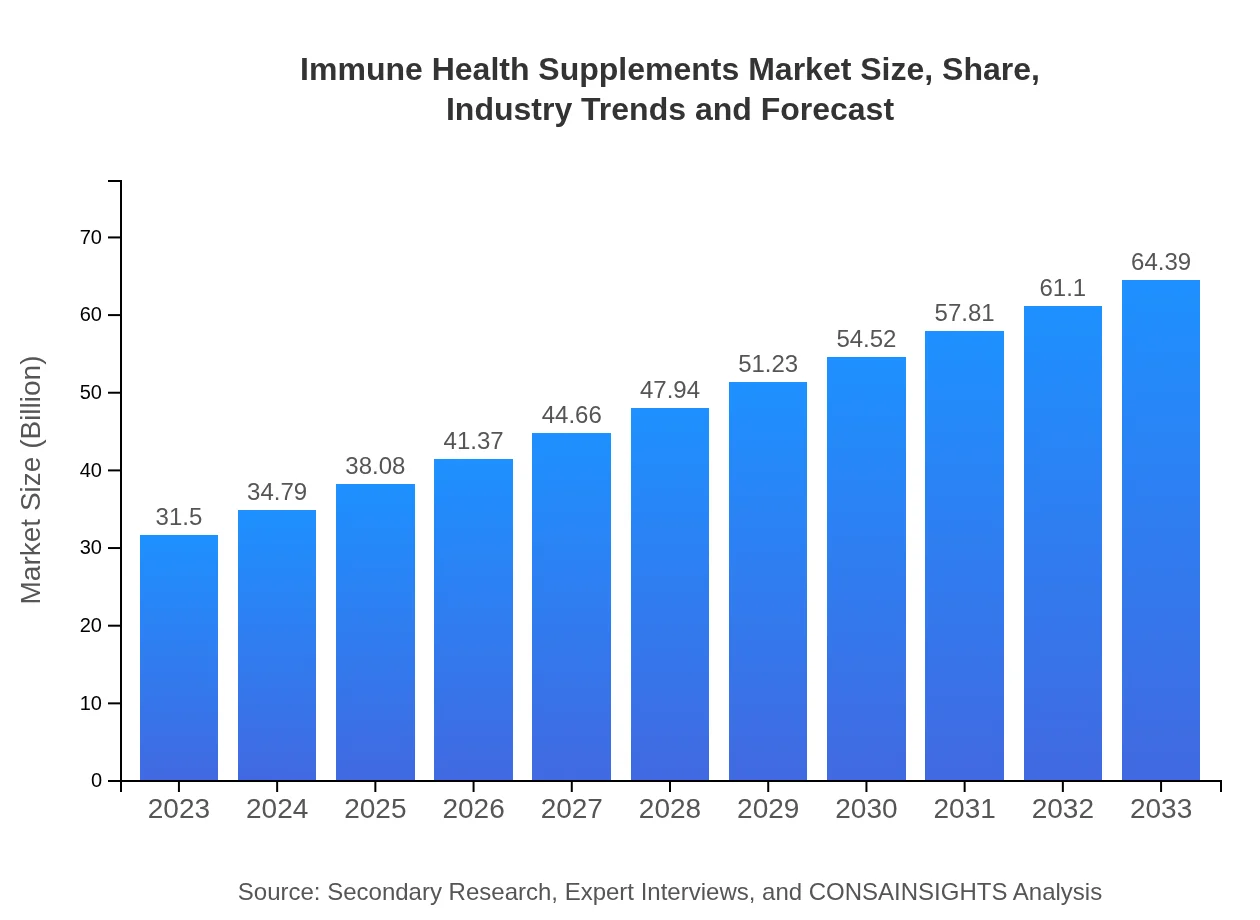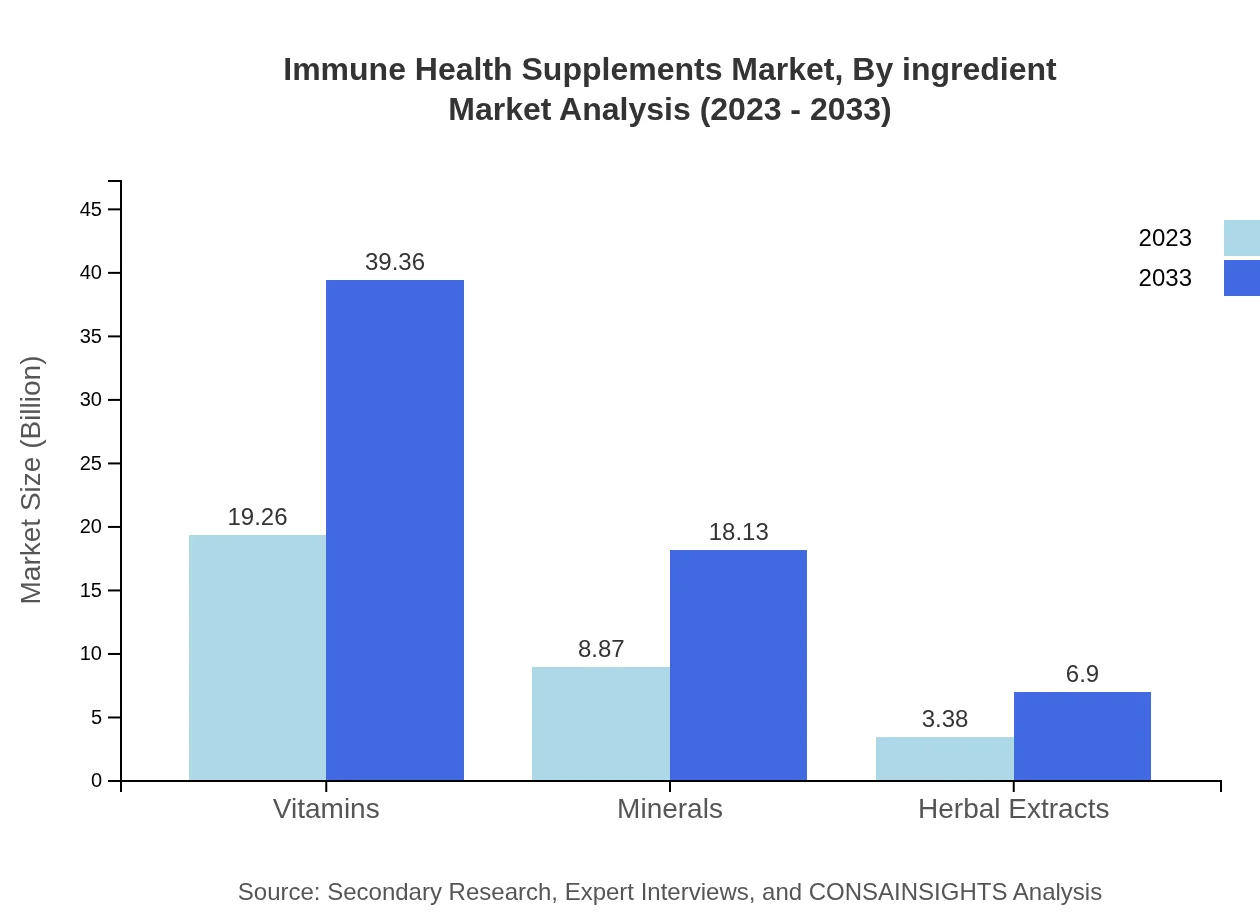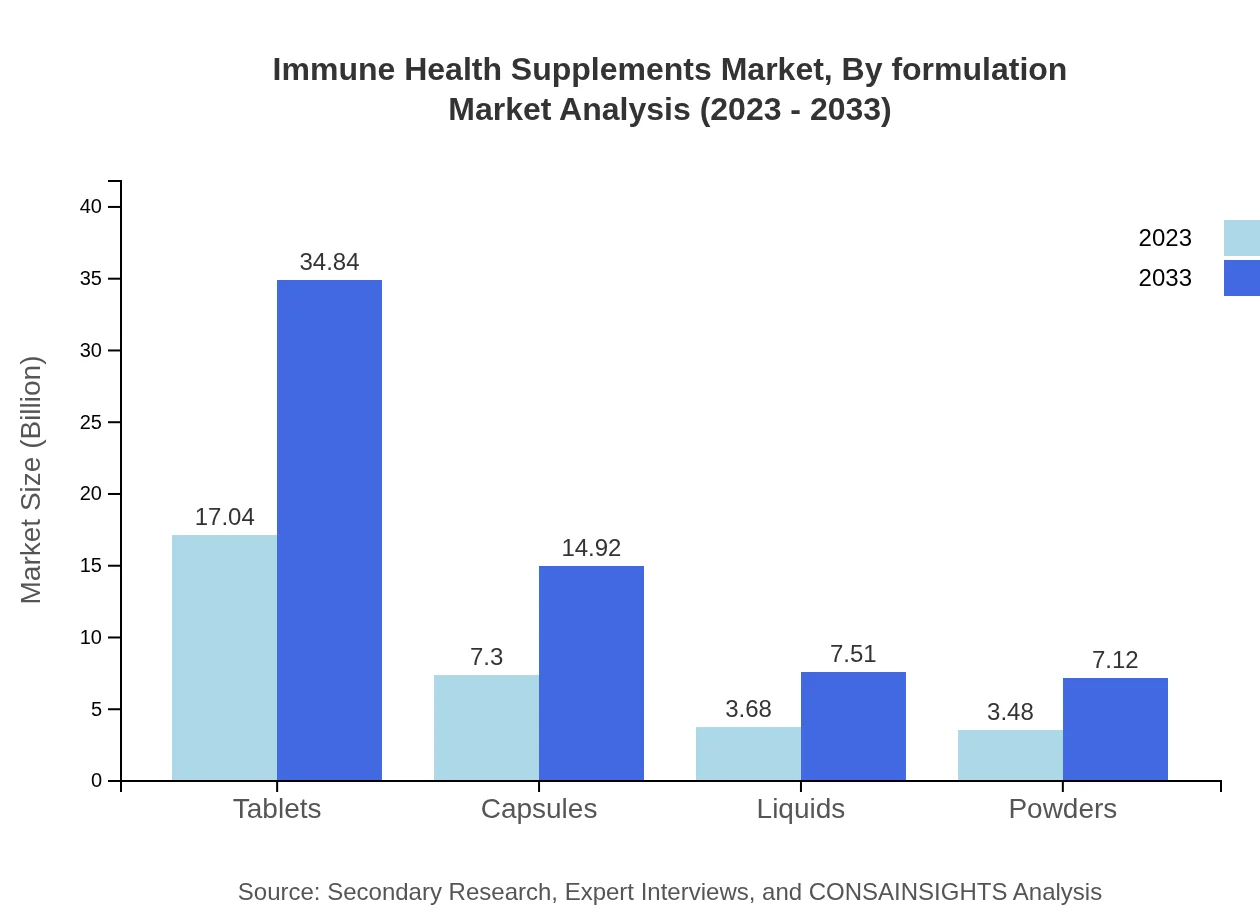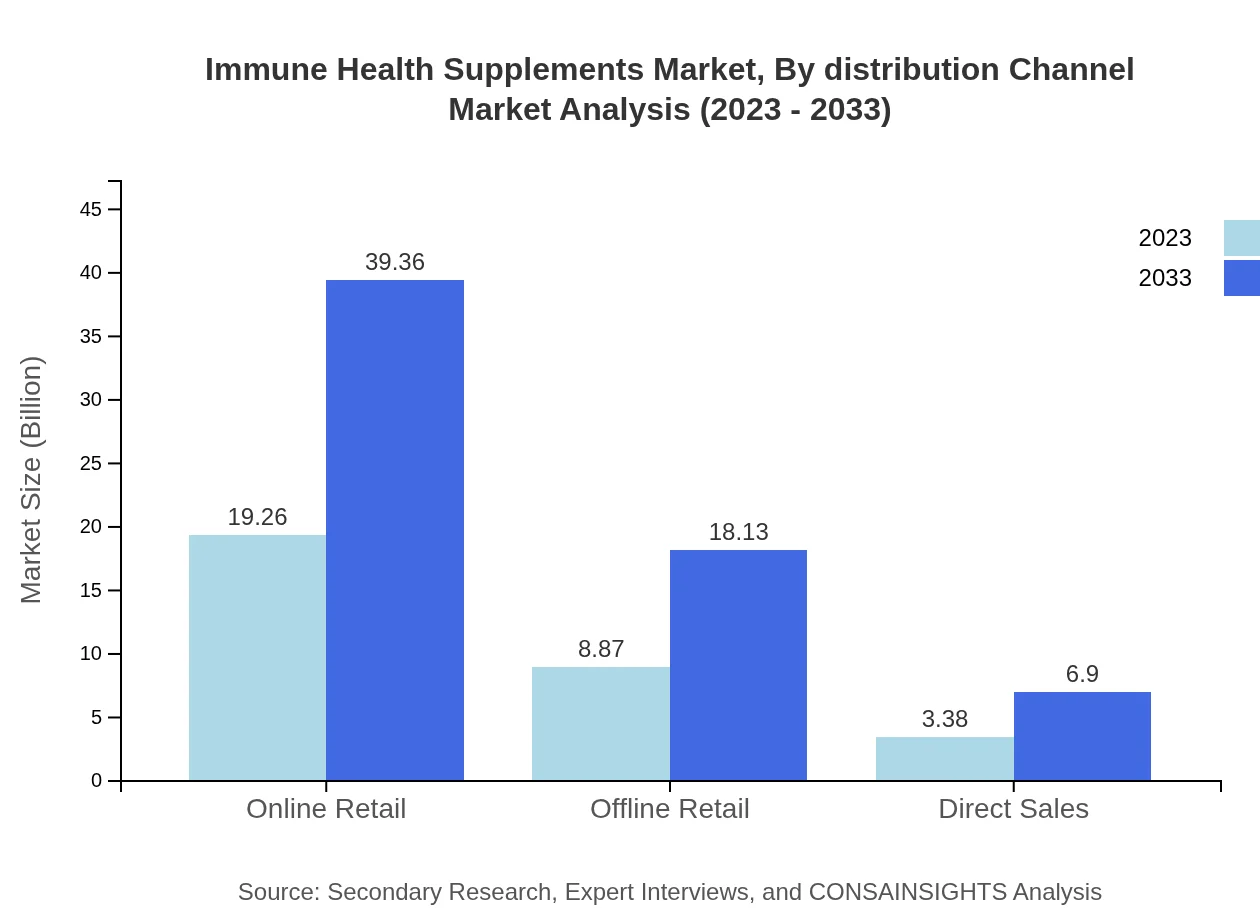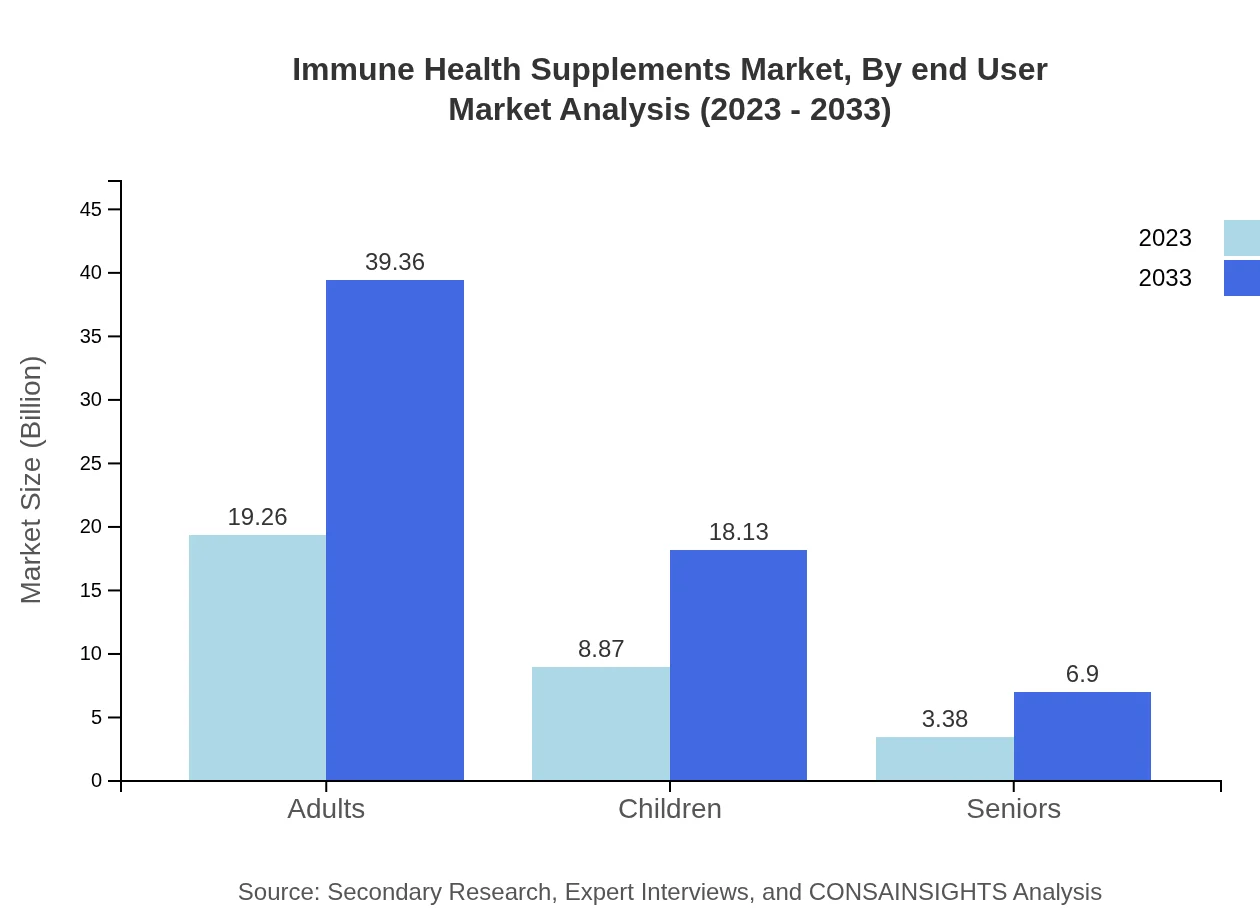Immune Health Supplements Market Report
Published Date: 31 January 2026 | Report Code: immune-health-supplements
Immune Health Supplements Market Size, Share, Industry Trends and Forecast to 2033
This report delves into the Immune Health Supplements market, analyzing key trends, market size, segment growth, and forecast data from 2023 to 2033. Insights include technological advancements, regional dynamics, and competitive landscape updates.
| Metric | Value |
|---|---|
| Study Period | 2023 - 2033 |
| 2023 Market Size | $31.50 Billion |
| CAGR (2023-2033) | 7.2% |
| 2033 Market Size | $64.39 Billion |
| Top Companies | Herbalife Nutrition Ltd., GNC Holdings, Inc., Amway Corporation, NOW Foods |
| Last Modified Date | 31 January 2026 |
Immune Health Supplements Market Overview
Customize Immune Health Supplements Market Report market research report
- ✔ Get in-depth analysis of Immune Health Supplements market size, growth, and forecasts.
- ✔ Understand Immune Health Supplements's regional dynamics and industry-specific trends.
- ✔ Identify potential applications, end-user demand, and growth segments in Immune Health Supplements
What is the Market Size & CAGR of Immune Health Supplements market in 2023?
Immune Health Supplements Industry Analysis
Immune Health Supplements Market Segmentation and Scope
Tell us your focus area and get a customized research report.
Immune Health Supplements Market Analysis Report by Region
Europe Immune Health Supplements Market Report:
Europe’s immune health supplements market was valued at USD 9.77 billion in 2023 with expectations to grow to USD 19.98 billion by 2033. The region is characterized by stringent regulations and a preference for high-quality products.Asia Pacific Immune Health Supplements Market Report:
The Asia Pacific region is estimated to sustain its growth trajectory with a market size of USD 5.92 billion in 2023, projected to reach USD 12.11 billion by 2033. Increased health awareness, a growing elderly population, and rising disposable incomes are driving demand.North America Immune Health Supplements Market Report:
North America holds one of the largest shares of the market, with a value of USD 11.10 billion in 2023. By 2033, it may reach USD 22.68 billion, driven by strong consumer adoption of immune health supplements, particularly among adults and seniors.South America Immune Health Supplements Market Report:
In South America, the market reflects a current size of USD 2.76 billion in 2023. By 2033, it is expected to grow to USD 5.64 billion, supported by rising health consciousness and the demand for natural health products.Middle East & Africa Immune Health Supplements Market Report:
The Middle East and Africa region shows significant growth potential, with the market size at USD 1.95 billion in 2023. Forecasted growth to USD 3.98 billion by 2033 can be attributed to increased health awareness and growing investments in the healthcare sector.Tell us your focus area and get a customized research report.
Immune Health Supplements Market Analysis By Ingredient
In 2023, the largest segment is vitamins, valued at USD 19.26 billion, expected to rise to USD 39.36 billion by 2033, holding a 61.13% share. Minerals follow with a market size of USD 8.87 billion, expanding to USD 18.13 billion. Herbal extracts display smaller market shares, with vitamins dominating due to widespread consumer familiarity and efficacy in immune support.
Immune Health Supplements Market Analysis By Formulation
Tablets represent a key formulation type, projected to grow from USD 17.04 billion in 2023 to USD 34.84 billion by 2033, capturing 54.11% of the market. Capsules and liquids also maintain considerable market shares, while powders cater to niche markets seeking specific health benefits.
Immune Health Supplements Market Analysis By Distribution Channel
Online retail is the dominant distribution channel, growing from USD 19.26 billion in 2023 to USD 39.36 billion by 2033, holding a 61.13% market share. Offline retail remains significant, particularly in regions with lower Internet penetration, while direct sales are also vital for personalized marketing strategies.
Immune Health Supplements Market Analysis By End User
Adults represent the largest consumer segment, with a market size of USD 19.26 billion in 2023, increasing to USD 39.36 billion by 2033. Children and seniors also exhibit growth potential, with tailored products designed to meet their unique nutritional needs.
Immune Health Supplements Market Trends and Future Forecast
Tell us your focus area and get a customized research report.
Global Market Leaders and Top Companies in Immune Health Supplements Industry
Herbalife Nutrition Ltd.:
A global leader in nutritional products, Herbalife offers a range of immune support products rich in vitamins and herbal extracts.GNC Holdings, Inc.:
Specializing in health and wellness products, GNC provides a variety of immune health supplements aimed at maintaining optimal immunity.Amway Corporation:
Known for its innovative health solutions, Amway emphasizes plant-based formulations in its immune health supplement offerings.NOW Foods:
A pioneer in natural products, NOW Foods focuses on quality and affordability in its immune health supplements, catering to a health-conscious consumer base.We're grateful to work with incredible clients.









FAQs
What is the market size of immune Health Supplements?
The global market size for immune health supplements is projected to reach approximately $31.50 billion by 2033, growing at a compound annual growth rate (CAGR) of 7.2% from 2023 to 2033.
What are the key market players or companies in this immune Health Supplements industry?
Key players in the immune health supplements industry include major brands specializing in vitamins, minerals, and herbal extracts. As the market expands, companies that invest in product innovation and marketing strategies are likely to lead the sector.
What are the primary factors driving the growth in the immune Health Supplements industry?
Key growth drivers for the immune health supplements market include rising health consciousness among consumers, an aging population, and increasing incidences of health-related issues, prompting more individuals to seek preventative supplements for immune support.
Which region is the fastest Growing in the immune Health Supplements?
The Asia Pacific region is emerging as the fastest-growing market for immune health supplements, with market size expected to increase from $5.92 billion in 2023 to $12.11 billion by 2033, reflecting strong demand and market expansion.
Does ConsaInsights provide customized market report data for the immune Health Supplements industry?
Yes, ConsaInsights offers tailored market report data specifically for the immune health supplements industry, accommodating the unique needs of businesses and investors looking for detailed market insights and analysis.
What deliverables can I expect from this immune Health Supplements market research project?
Expect deliverables including comprehensive market analysis, trend evaluations, competitive landscape reports, consumer preferences, and segmentation data, all aimed at providing actionable insights for stakeholders in the immune health supplements market.
What are the market trends of immune Health Supplements?
Current trends in the immune health supplements market include a shift towards natural and organic products, increasing online sales channels, and a growing interest in personalized nutrition to enhance immune function and overall health.

